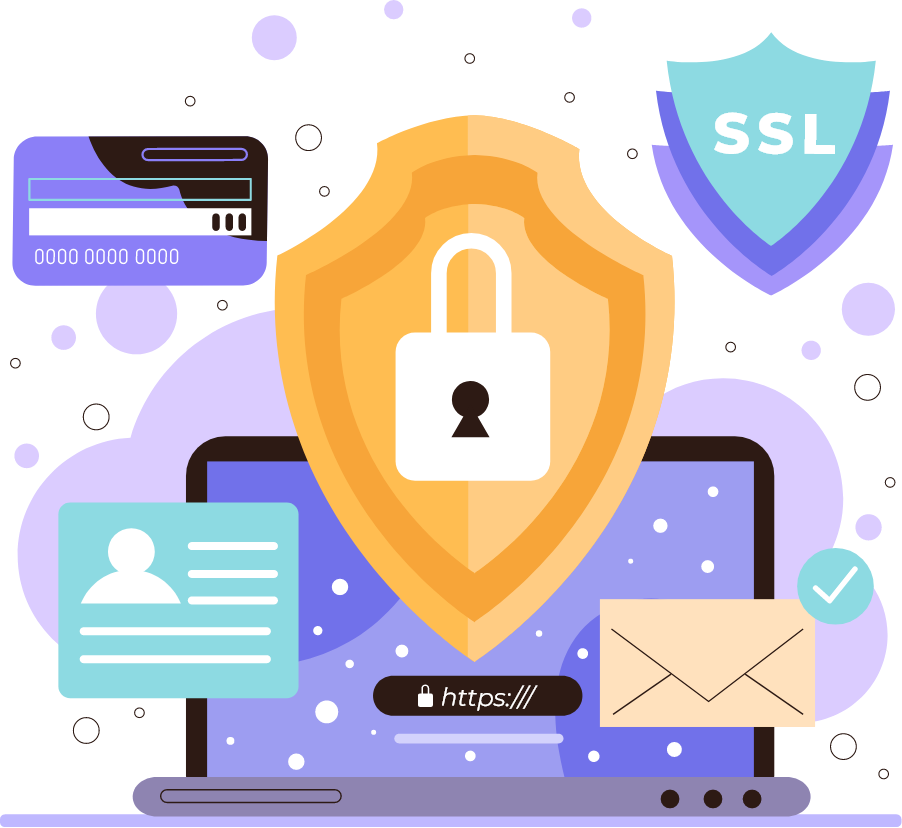An Enterprise SSL Solution offers unparalleled security and trust for your business.
Secure web servers & load balancers
Automate Certificate Lifecycle Management and Secure Every Server Across Your Environment with our Enterprise SSL Solution.

SSL/TLS Certificates Are Essential to Securing Web Servers and Load Balancers
In today’s enterprise, the combination of the increased number of servers and more complex networks has driven the need for a modern approach to automating the lifecycle management for enterprise SSL certificates. VCANTECH Certificate Manager makes it simple by providing an automated SSL certificate management solution to secure every server across your environment.
SSL and TLS certificates are essential tools for ensuring secure and private communication over the internet.
Why Choose VCANTECH for having SSL & TLS Certificate?
SSL (Secure Socket Layer) and TLS (Transport Layer Security) certificates provide essential security and encryption benefits for internet communications. Here are some key benefits of using SSL and TLS certificates

Data Encryption
SSL and TLS certificates encrypt data exchanged between a client (such as a web browser) and a server. This encryption ensures that sensitive information, such as passwords, credit card details, and personal data, is secure during transmission, making it difficult for unauthorized individuals to intercept and read the data.

Data Integrity
SSL and TLS certificates use digital signatures to ensure data integrity. This means that the data sent from the server to the client remains unchanged during transmission. If any tampering or modification of the data occurs, the digital signature will be invalidated, and the recipient will be alerted that the data may be compromised.

Authentication
SSL and TLS certificates provide authentication, verifying the identity of the website or server to the user's browser. This authentication is crucial for preventing phishing attacks, as it allows users to verify that they are communicating with the legitimate website they intended to visit.

Trust and Credibility
When a website uses SSL/TLS, it displays a padlock icon or "HTTPS" in the browser's address bar. This indicates to users that the website is secure and trustworthy, enhancing the credibility of the website and the organization behind it.

SEO Ranking Boost
Major search engines, like Google, consider HTTPS as a ranking signal. Websites with SSL/TLS certificates are more likely to receive a slight boost in search engine rankings, improving their visibility to potential visitors.

Compliance and Data Protection
SSL and TLS certificates are often required for compliance with data protection regulations, such as the General Data Protection Regulation (GDPR). Organizations handling sensitive user data are expected to encrypt and protect that data during transmission.

Secure Online Transactions
SSL and TLS certificates are crucial for securing online transactions, such as e-commerce purchases or online banking. They ensure that financial information and credit card details remain confidential and safe from interception.

Safe Login Processes
SSL and TLS protect login credentials, ensuring that usernames and passwords are encrypted during login attempts. This prevents unauthorized individuals from gaining access to user accounts through intercepted login data.

Secure Email Communication
SSL/TLS certificates can also be used for securing email communication, similar to S/MIME certificates. This protects email content, attachments, and sender authenticity during transmission.
Still Manually Managing SSL/TLS Certificates?
Contact Us
Do you have a question that we can help to answer? Our team is ready to assist you.
Schedule a Demo
FAQS
What is an SSL certificate?
An SSL certificate is a digital certificate that authenticates the identity of a website and encrypts the data transmitted between a user's web browser and the server. It ensures that sensitive information, such as login credentials, credit card details, and personal data, remains secure during transmission.
What is TLS, and how does it differ from SSL?
TLS (Transport Layer Security) is the successor of SSL (Secure Socket Layer). While SSL was widely used in the past, it has been deprecated due to security vulnerabilities, and TLS is now the standard protocol used for secure communication over the internet. The term "SSL" is often used colloquially to refer to both SSL and TLS certificates.
How does SSL/TLS encryption work?
SSL/TLS encryption uses a combination of asymmetric and symmetric encryption. When a user connects to a website with an SSL/TLS certificate (HTTPS), the browser and server establish a secure connection through a process called the TLS Handshake. During this handshake, the server presents its SSL/TLS certificate to the browser, which contains the server's public key. The browser then generates a session key (symmetric key) to encrypt the data exchanged between the client and server during the session.
Why is an SSL/TLS certificate essential for websites?
An SSL/TLS certificate is crucial for websites because it ensures the security, privacy, and integrity of data exchanged between the website and its visitors. It prevents unauthorized interception of sensitive information and protects against man-in-the-middle attacks, enhancing the trustworthiness of the website.
How do I know if a website has an SSL/TLS certificate?
When a website has an SSL/TLS certificate, it is indicated by "HTTPS" in the website's URL and a padlock icon in the browser's address bar. Modern browsers also display warnings when users try to visit non-secure (HTTP) websites that collect sensitive data.
How do I obtain an SSL/TLS certificate for my website?
To obtain an SSL/TLS certificate, you need to purchase one from a reputable Certificate Authority (CA) or use a CA that offers free certificates. You will need to generate a Certificate Signing Request (CSR) on your web server, submit it to the CA during the certificate application process, verify your domain ownership, and then receive and install the issued certificate on your server.
What types of SSL/TLS certificates are available?
There are several types of SSL/TLS certificates, including Domain Validated (DV), Organization Validated (OV), Extended Validation (EV), Wildcard, and Multi-Domain (SAN) certificates. Each type varies in the level of validation and the number of domains or subdomains it can secure.
How long is the validity period of an SSL/TLS certificate?
The validity period of an SSL/TLS certificate typically ranges from one to three years. Certificate authorities issue certificates with different validity periods, and website owners must renew their certificates before they expire to maintain secure communication.
Are SSL/TLS certificates necessary for all websites, even small ones?
Yes, SSL/TLS certificates are necessary for all websites, regardless of their size. Even small websites that don't handle sensitive data can benefit from SSL/TLS encryption. It improves security, boosts SEO rankings, and helps build trust with visitors.
Can SSL/TLS certificates be used for email encryption?
No, SSL/TLS certificates are specifically designed for securing web communication. To secure email communication, you would need S/MIME (Secure/Multipurpose Internet Mail Extensions) certificates, which are specifically designed for email encryption and authentication.


